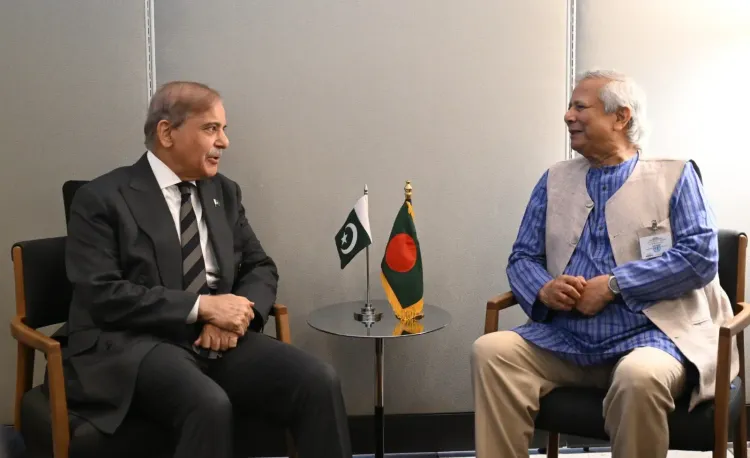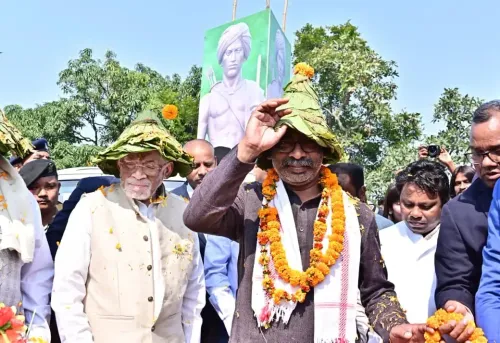Can Bangladesh's Yunus Collaborate with Pakistan to Revive SAARC?

Synopsis
Key Takeaways
- Muhammad Yunus is attempting to revive SAARC amid political turmoil.
- SAARC has been stagnant due to Pakistan's hindrances and terrorism support.
- BIMSTEC offers an alternative for regional cooperation without Pakistan.
- India actively supports BIMSTEC to enhance connectivity and counter external influences.
- The political and economic landscape in Bangladesh is currently unstable.
Dhaka: Muhammad Yunus, the head of the interim government in Bangladesh, is making urgent efforts to rejuvenate the South Asian Association for Regional Cooperation (SAARC)—a regional collective that has been at a standstill for more than a decade, primarily due to Pakistan's endorsement of cross-border terrorism and its ongoing hindrance of various development projects.
While attending the United Nations General Assembly in New York, Yunus highlighted the delay in SAARC summits since the 2014 gathering in Kathmandu. Just weeks prior, he discussed the possibility of revitalizing SAARC with Ishaq Dar, Pakistan's Deputy Prime Minister and Foreign Minister, during a meeting in Dhaka on August 24.
In the current absence of democracy, the fragile and illegitimate interim government in Bangladesh is striving to distract public focus by echoing Pakistan's rhetoric on SAARC's revitalization.
SAARC was established in Dhaka on December 8, 1985, with the noble intention of promoting economic and social progress, cultural interchange, and regional stability among its eight member states: Afghanistan, Bangladesh, Bhutan, India, Maldives, Nepal, Pakistan, and Sri Lanka.
New Delhi has long hoped for SAARC to take a leadership role in the region, but Pakistan's persistent support for terrorism has rendered the organization ineffective and incapable. India asserts that SAARC remains stagnant because of Pakistan's actions.
Pakistan's anti-India initiatives have consistently hampered SAARC's progress. Currently, Rawalpindi continues to foster terrorism in the region.
In 2016, following the stagnation of SAARC after the Uri terror attack, the Bay of Bengal Initiative for Multi-Sectoral Technical and Economic Cooperation (BIMSTEC) began to gain traction.
Founded on June 6, 1997, this regional organization unites seven member nations in South and Southeast Asia, including Bangladesh, Bhutan, India, Nepal, and Sri Lanka from South Asia, along with Myanmar and Thailand from Southeast Asia. It bridges these two regions, emphasizing economic and technical cooperation among its members while navigating complications posed by Pakistan.
In India's strategic and foreign policy framework, BIMSTEC prioritizes enhanced connectivity, economic integration, and human security.
“BIMSTEC not only connects South and Southeast Asia but also the ecologies of the Great Himalayas and the Bay of Bengal. With shared values, histories, ways of life, and interconnected destinies, BIMSTEC represents a common space for peace and development. For India, it is a natural platform to fulfill our key foreign policy priorities of Neighbourhood First and Act East,” stated Prime Minister Narendra Modi during the 20th anniversary of BIMSTEC in June 2017.
Significantly, India's commitment through BIMSTEC has intensified in addressing China's strategic outreach in the region.
Unlike SAARC, which faces numerous challenges, India perceives BIMSTEC as brimming with new energy and opportunities. With Pakistan excluded from BIMSTEC, India has revitalized its historical connections with Southeast and East Asian countries via the Shipping Lanes of Communication (SLOCS). India serves not only as a net-security provider for the Indian Ocean but also has vested interests in the entire Indo-Pacific due to its rising trade and economic aspirations.
Simultaneously, India is closely monitoring the burgeoning Bangladesh-Pakistan camaraderie, with radical Islamists creating bonds between Islamabad and Dhaka under Yunus like never before.
Given the deteriorating situation along the Bangladesh-Myanmar border, Pakistan has amplified its diplomatic and military presence in Bangladesh. India must ensure that Bangladesh, as a BIMSTEC member, emerges as a key partner in the Act East policy rather than descending into a fundamentalist Islamic state.
Since former Prime Minister Sheikh Hasina's departure, Yunus' Bangladesh faces a severe economic downturn characterized by rising inflation, dwindling foreign exchange reserves, falling remittances, and political instability that deters investment. The health impacts are stark as well. The World Bank projects Bangladesh's real GDP growth to further decline to 3.3 percent in FY-25 due to falling private and public investment. Political uncertainty, alongside rising costs of borrowing and inputs, is expected to hinder private investment growth and keep industrial growth subdued.
At this juncture, the unelected and unaccountable Yunus interim government, perceived as a puppet of the US and West, has solidified into a totalitarian regime marked by brutality. It is stifling academic freedom, persecuting women leaders, and manipulating the justice system, even as the instances of custodial deaths, politically orchestrated mob lynchings, and religious persecution targeting Hindu minorities continue to rise.
(The author is a specialist in South Asia and Eurasia, previously associated with the Manohar Parrikar Institute for Defence Studies and Analyses. The views expressed here are personal.)









